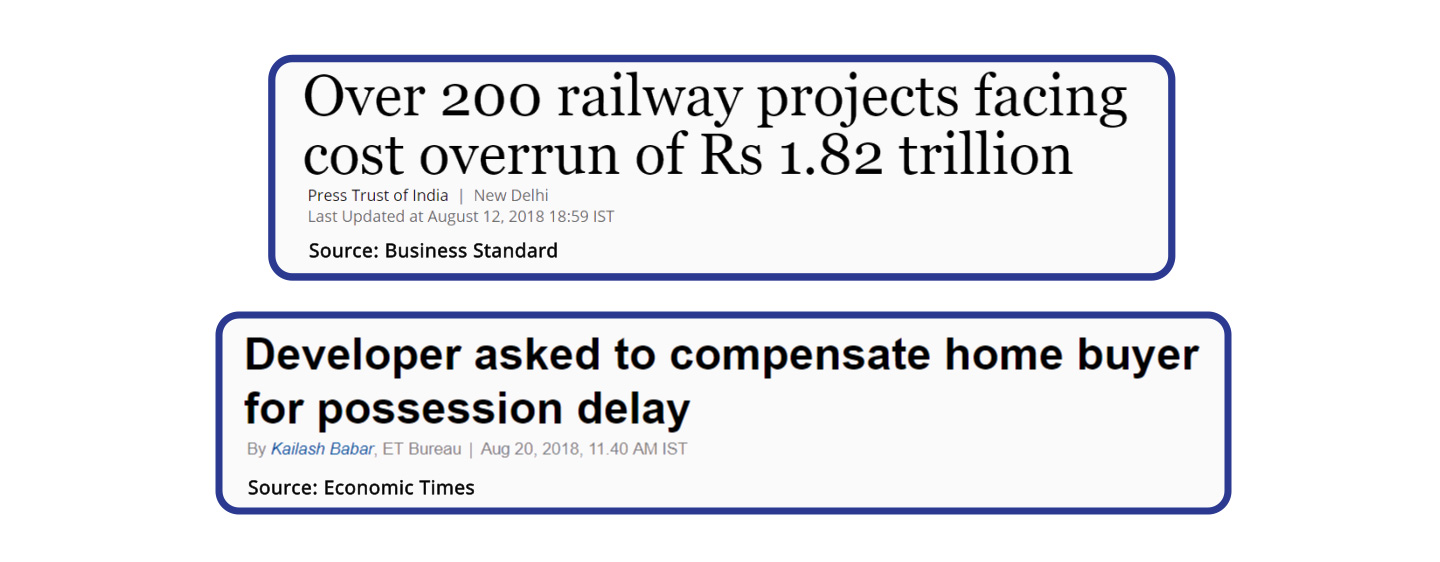Long delays in infrastructure projects lead to public inconvenience and cost overruns. The cost of these delays is often borne by the people.
On 1st May 2017, the Real Estate Regulatory Act came into force which protects consumers in case a real-estate project is delayed. Under the act, builders are liable to pay compensation if they fail to complete the project on time.
In April this year, a real-estate company Manohar Infrastructure and Constructions Private Limited was directed by Chandigarh State Consumer Disputes Redressal Commission to pay ₹11 crore refund to 26 consumers. The compensation was awarded to compensate for delays, interests on capital, litigation fees, etc.
It is a welcome development that the real-estate developers are being held accountable for their inefficiencies and failing to meet their promises. But when will we start holding our politicians and bureaucrats accountable for failing to discharge their duties and wasting thousands of crores of our hard-earned money in needless delays? Let us see a few examples of government wastage of taxpayers’ money due to delays of public projects:
Around 30 railway projects currently underway across the country are facing cost-overruns of about ₹53,000 crore. Indian Railways currently have more than 345 projects underway. The aggregate loss to taxpayers due to delays could very well add up to ₹3 lakh crore. Further, About 111 power projects in India out of total 1,200 are running behind schedules and have incurred cost-overruns of over ₹61,000 crore and an average time overrun of three and half years.
Just as the private developers are being held accountable for not completing their projects on time, the government functionaries should also be held accountable for delays. According to the World Bank, to start a real-estate project in Mumbai, 37 permissions are required to be completed and it takes at least 6 months for them. The total cost of acquiring these permissions is over ₹160,000 legally. In such an environment, completion of projects on time is highly unlikely.
For any delays in the implementation of public projects, the officer(s) in-charge should be held personally responsible for causing the delay. Why must the private sector operate on one set of rules and the government on another? We must hold both of them equally accountable if they fail to live up to their promise. Only when there is incentive or disincentive when performing a duty satisfactorily or unsatisfactorily, will that duty be performed well and in-time.
Long delays in infrastructure projects lead to public inconvenience and cost overruns. They hamper the development of the country and result in loss of taxpayers’ money. Delays may take place due to several reasons including bureaucratic hassles, difficulty in land-acquisition, labor issues, lack of coordination among government bodies, etc.
The cost of these delays is often borne by the people. If a government project is delayed, everyone is forced to pay a price for it. Just as RERA has imposed cost on private developers for not meeting their promises, it is time we impose a similar cost on the person-in-charge in the government.

